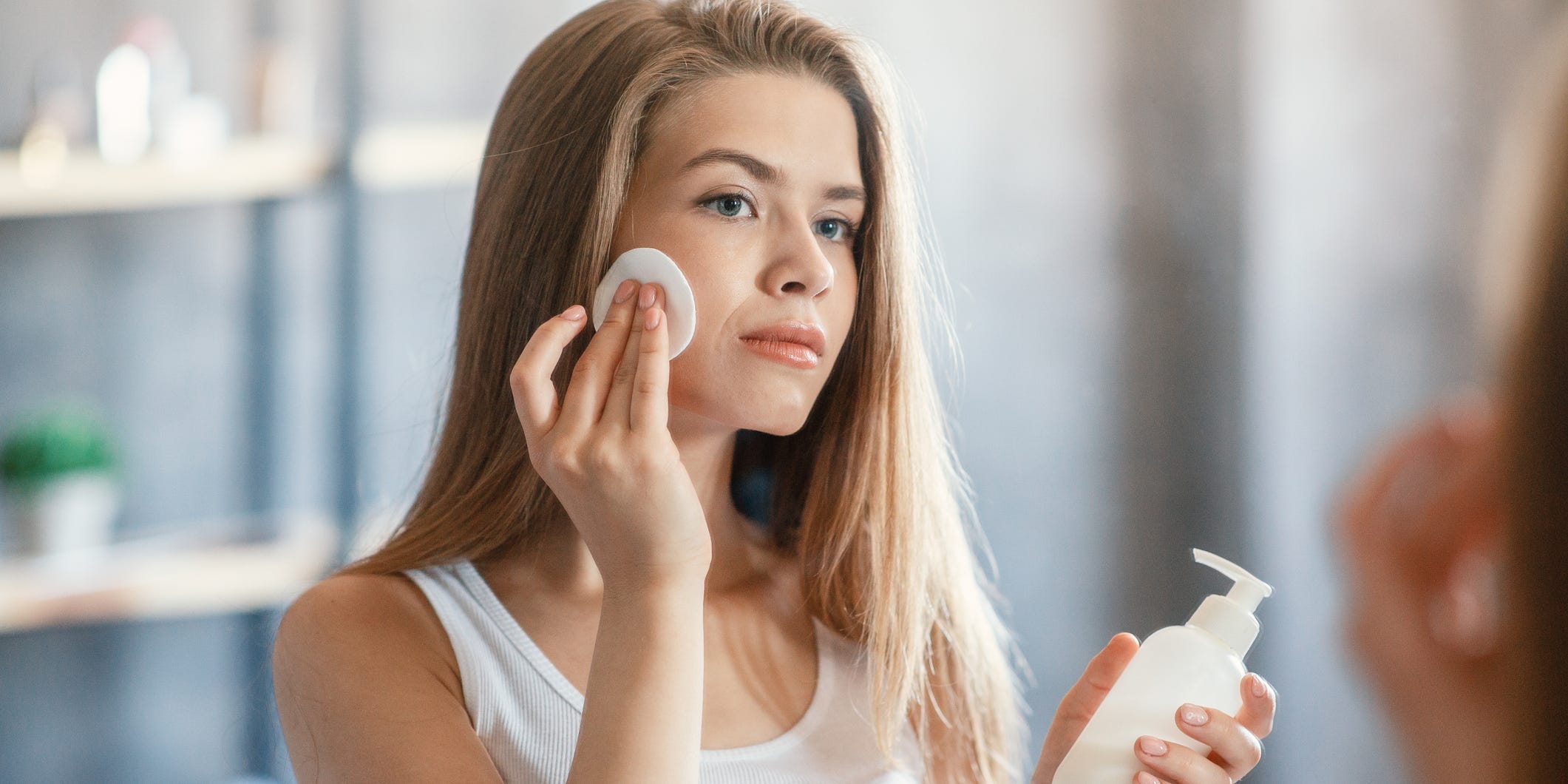
Prostock-Studio/Getty Images
- The benefits of micellar water include the ability to cleanse the skin, promote hydration, and help treat acne.
- Micellar water contains little balls of oil that act like magnets to attract dirt and other impurities on the skin’s surface.
- To use micellar water, you should apply the water to a cotton pad and then use the pad to clean your face.
- This article was medically reviewed by Debra Jaliman, MD, a board-certified dermatologist with a private practice in New York City.
- Visit Insider’s Health Reference library for more advice.
Micellar water is a skincare product used to cleanse the skin, moisturize, and remove makeup. It’s a popular alternative to harsher skin cleansers with ingredients like alcohol that can irritate sensitive skin.
But because micellar water isn’t as aggressive in removing oil, it may not work as well for people with very oily skin or severe acne. Here’s what you need to know about how micellar water works and whether it’s right for your skin.
What is micellar water?
Micellar water is made up of purified, demineralized water, along with micelles, which are tiny balls of oil that stay suspended in the water.
“The micelles act like tiny magnets to attract impurities on the skin’s surface such as dirt, oil, and makeup,” says Julie E. Russak, MD, a board-certified dermatologist, a fellow of the American Academy of Dermatology, and founder of Russak Dermatology Clinic.
Micellar water is very effective in removing this surface-level grime without stripping the oil from your skin, which can throw off the skin’s natural balance, Russak says.
Your skin naturally contains an outer barrier made up of proteins and oils that hold the proteins together. Cleansers like alcohol-based toners can disrupt this barrier, so that it is no longer able to hold moisture. This can lead to dry skin that may be more prone to infections.
Micellar works for a wide range of skin types, including people with sensitive skin, Russak says. But because it contains oil, people with oilier skin may want to look for specialized micellar water products that are specifically made for oily skin.
Benefits of micellar water
Micellar water has many beneficial uses – it can cleanse your skin, help keep it hydrated, and may also be helpful as a part of an acne treatment regimen.
1. Cleanses your skin. Traditional cleansers can disrupt the oils in your skin barrier and leave behind traces of chemicals, making your skin red, irritated, and dry. But micellar water cleanses the dirt and oils on top of your skin without harming your skin's protective barrier. This is important because the oils in your skin barrier actually help keep out microbes like bacteria that can cause infections and irritation.
2. Promotes hydration and moisture. "Micellar water doesn't necessarily moisturize the skin," Russak says. "But it is able to clean the skin without stripping it of its natural moisture like other cleansers can do." Many brands of micellar water also contain moisturizing ingredients like glycerin, which draws water in from the air and up from the lower layers of your skin.
3. Helps treat acne. There are no formal studies on micellar water as a treatment for acne, but Russak says that its cleansing properties may be a helpful part of treatment. Acne occurs when your pores become clogged by oil or bacteria, which then triggers the inflammation that causes redness and swelling. Because micellar water is naturally effective at removing oil and debris from your skin, it may help reduce acne outbreaks, Russak says.
The gentle nature of micellar water may also help keep acne from getting worse. If you use a cleanser that removes too much oil, it can actually trigger your skin to produce more oil, which may lead to a breakout.
How to use micellar water
You can use micellar water daily — once in the morning and again at night — to cleanse skin and remove makeup.
To get the best results from micellar water, you will need to use cotton pads to apply it to your face. This is because the molecules in micelles are two-sided, and while one side soaks into the pad, the other, which attracts dirt and oil, reaches outward to cleanse your face.
If you have very oily skin or wear waterproof makeup, you may need to use your normal cleanser in addition to micellar water. That's because micellar water is less aggressive in removing oil than many other cleansing products, so some people may find that it isn't enough on its own.
Russak also suggests using it with another skin cleanser, as it can leave oil on the surface of your skin if used alone. "I do recommend washing the skin at night after using micellar water, to remove the micelles from the skin," Russak says. This can help other nighttime products like moisturizers or acne medications penetrate deeper into the skin where they work best.
The bottom line
Micellar water can help clean your skin while keeping it healthy and hydrated. Though more research is needed, it may also help keep acne at bay. If you aren't sure if micellar water is right for your skin type, talk to your dermatologist to find the best option for you.
Related articles from Health Reference:
- Yes, birth control helps acne. Here are the best options.
- Pregnancy can cause acne but there are safe ways to treat it
- The best facial cleanser ingredients for each skin type, according to dermatologists
- These are the best, most effective ingredients you should look for in a moisturizer
- The 6 best natural ingredients for your hair
